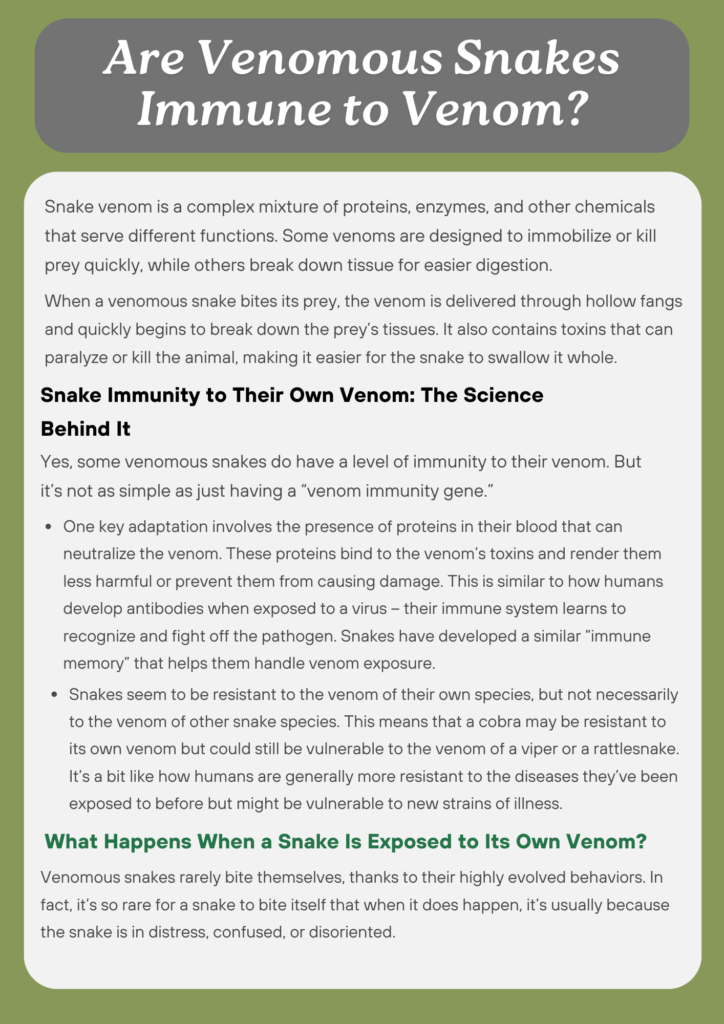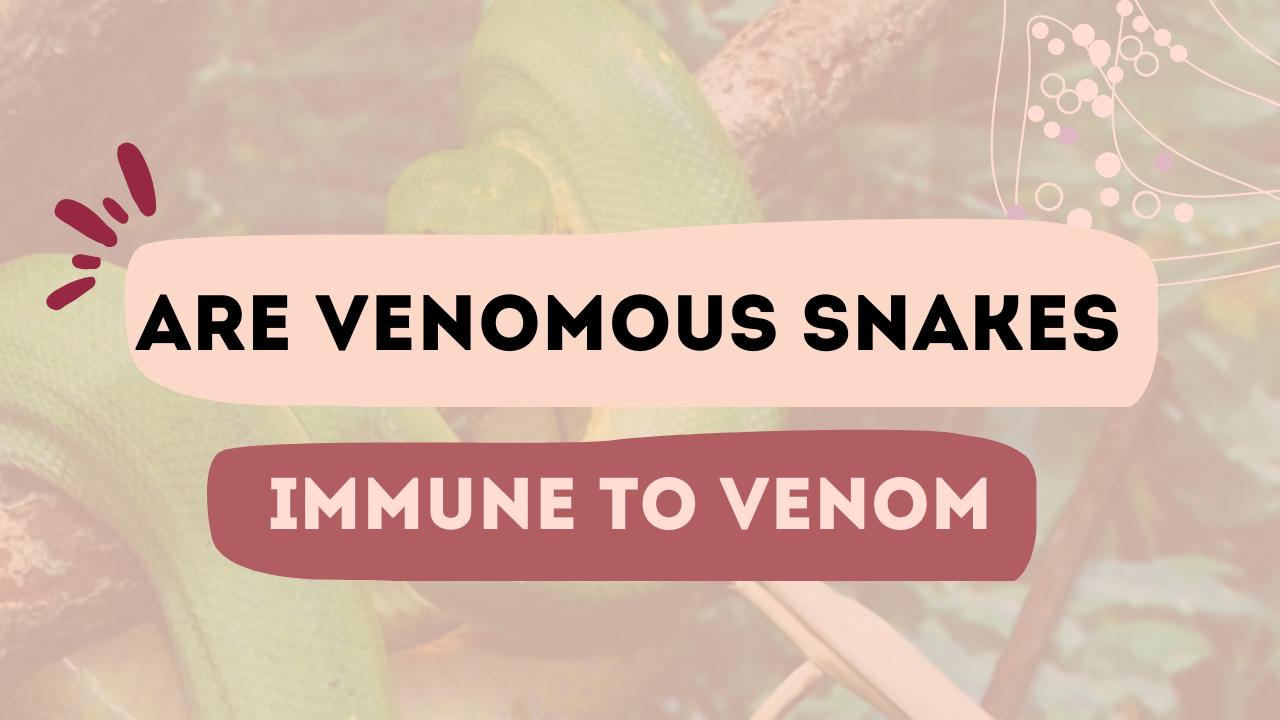Have you ever wondered if venomous snakes are immune to their own venom? It’s a fascinating question that’s been tossed around for years, and for good reason. After all, snakes are among the most venomous creatures in the world, with many species capable of delivering fatal bites to their prey or even to humans. So, it makes sense to ask – if they can inject venom, are they also safe from it? It seems like a straightforward question, but the truth is a bit more complicated than you might think. In this article, we’re going to dive into the science behind snake venom and whether or not these slithery creatures are immune to the very toxins they produce.
Venomous Snakes: Nature’s Deadly Weapons
First things first, let’s talk about venom. Snake venom is a complex mixture of proteins, enzymes, and other chemicals that serve different functions. Some venoms are designed to immobilize or kill prey quickly, while others break down tissue for easier digestion. You’ve probably heard of some famous venomous snakes like cobras, vipers, and rattlesnakes. These snakes rely on their venom as a key tool for hunting and self-defense.
Now, imagine being one of these snakes. You’ve evolved to produce a venom powerful enough to incapacitate or kill your prey, but what if it also had the potential to harm you? That’s the dilemma faced by many venomous snakes, so you might think that they’d need some sort of immunity to survive their own venom. And you’d be right to think that. So, are venomous snakes immune to venom? Let’s break it down.
The Biology of Snake Venom
Before we get into whether snakes are immune to venom, it’s important to understand what venom actually does. Snake venom acts as both a weapon and a digestive aid. When a venomous snake bites its prey, the venom is delivered through hollow fangs and quickly begins to break down the prey’s tissues. It also contains toxins that can paralyze or kill the animal, making it easier for the snake to swallow it whole.
Venom can contain a wide range of substances, including neurotoxins (which attack the nervous system), hemotoxins (which destroy red blood cells and blood vessels), and cytotoxins (which kill cells). These toxins are incredibly potent, and while they might be perfectly suited for immobilizing prey, they’re also incredibly dangerous. So, how does the snake avoid being harmed by its own deadly weapon?

Snake Immunity to Their Own Venom: The Science Behind It
As it turns out, many venomous snakes have developed an incredible defense mechanism that helps them avoid the harmful effects of their own venom. The short answer is: yes, some venomous snakes do have a level of immunity to their venom. But it’s not as simple as just having a “venom immunity gene.”
Here’s where things get a bit more interesting – rather than being fully immune, snakes have evolved specific adaptations that help them withstand the effects of their own venom. These adaptations are often related to their immune system and the way their bodies respond to venom.
One key adaptation involves the presence of proteins in their blood that can neutralize the venom. These proteins bind to the venom’s toxins and render them less harmful or prevent them from causing damage. This is similar to how humans develop antibodies when exposed to a virus – their immune system learns to recognize and fight off the pathogen. Snakes have developed a similar “immune memory” that helps them handle venom exposure.
Another interesting fact is that snakes seem to be resistant to the venom of their own species, but not necessarily to the venom of other snake species. This means that a cobra may be resistant to its own venom but could still be vulnerable to the venom of a viper or a rattlesnake. It’s a bit like how humans are generally more resistant to the diseases they’ve been exposed to before but might be vulnerable to new strains of illness.
Venom Immunity Varies Between Species
Now, not all venomous snakes have the same level of immunity. The level of resistance to venom varies between species, and even individual snakes within a species might have different levels of immunity. Some snakes, like certain cobras, have developed a more robust immunity to their venom than others. For example, king cobras are known to be particularly resistant to their venom and can even bite and consume other venomous snakes without significant harm.
But other species might be more vulnerable to their venom, especially if they suffer a large dose or are already in a weakened state. So, while many venomous snakes have evolved to cope with their venom, it’s not a perfect system. There’s still a risk of self-intoxication under certain circumstances.
What Happens When a Snake Is Exposed to Its Own Venom?
Now, what happens if a snake gets bitten by another snake of the same species, or even accidentally bites itself? For the most part, snakes are able to handle small amounts of their venom without any ill effects. However, if a snake were to receive a large dose of its own venom, the results could be dangerous. In extreme cases, this could lead to tissue damage, paralysis, or even death.
Interestingly, venomous snakes rarely bite themselves, thanks to their highly evolved behaviors. In fact, it’s so rare for a snake to bite itself that when it does happen, it’s usually because the snake is in distress, confused, or disoriented. In cases where a snake does get a significant dose of venom, it would likely rely on its immune system to minimize the effects. However, if the venom overwhelms the snake’s defenses, it could succumb to its own toxins.
Conclusion
So, are venomous snakes immune to their venom? Well, the answer is a bit of a mixed bag. Some snakes have developed a strong resistance to their venom, allowing them to inject it into prey without being harmed themselves. However, they aren’t fully immune, and large doses or bites from other snakes can still cause harm. Snake venom is a complex and fascinating part of nature, and the way these creatures have evolved to cope with their own toxins is truly remarkable.
In the end, it’s clear that venomous snakes aren’t completely immune to their venom, but they are certainly well-equipped to handle it in most situations. The next time you encounter a venomous snake (hopefully from a safe distance!), you can appreciate the incredible adaptations that allow it to use its venom without succumbing to it.

